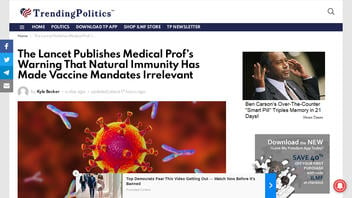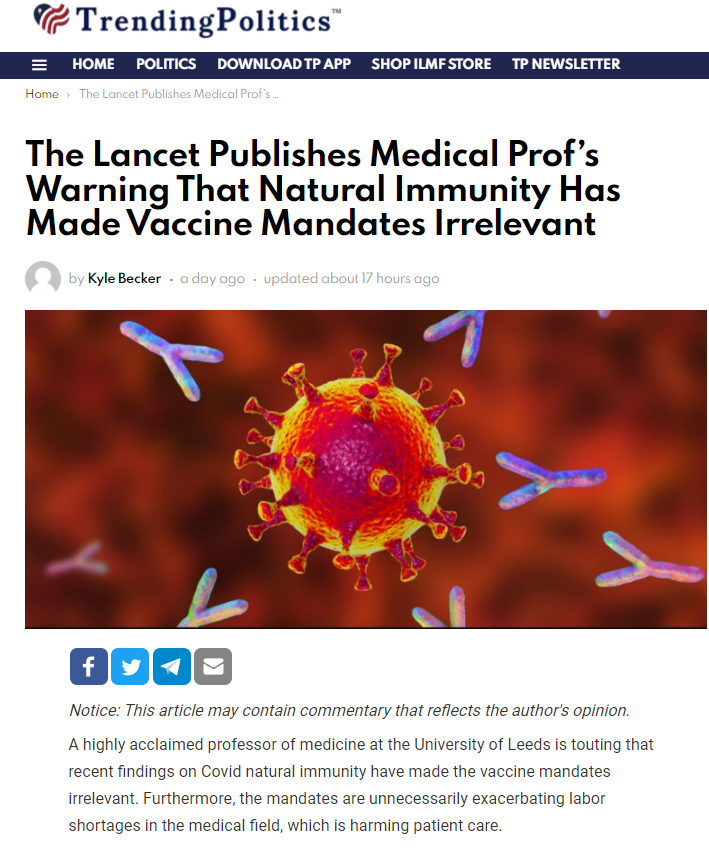
Did The Lancet publish a medical professor's warning that natural immunity has made vaccine mandates irrelevant? No, that's not true: The professor cited never uses the word "irrelevant" in his letter to the British medical journal but he does say there are "compelling arguments against such unilateral mandates." It's important to note that the professor is specifically talking about health care workers who have recovered from COVID-19 infection while the industry is in the middle of a labor shortage. He's not recommending this for the population as a whole.
The claim appeared in an article (archived here) published by Trending Politics on February 16, 2022, titled "The Lancet Publishes Medical Prof's Warning That Natural Immunity Has Made Vaccine Mandates Irrelevant." It opened:
A highly acclaimed professor of medicine at the University of Leeds is touting that recent findings on Covid natural immunity have made the vaccine mandates irrelevant. Furthermore, the mandates are unnecessarily exacerbating labor shortages in the medical field, which is harming patient care.
This is what the Trending Politics article looked like on February 17, 2022:
(Source: Trending Politics screenshot taken on Thu Feb 17 16:14:49 2022 UTC)
The Trending Politics article cites a letter from Dennis McGonagle, a professor of medicine at the University of Leeds in England, that was published on February 7, 2022, in The Lancet Rheumatology titled "Health-care workers recovered from natural SARS-CoV-2 infection should be exempt from mandatory vaccination edicts." While the Trending Politics headline and article say McGonagle calls vaccine mandates "irrelevant," the word appears nowhere in the letter to The Lancet. The professor specifically argued that health care workers who have had COVID are not an increased threat to their patients and should be exempt from vaccine mandates as a condition of their employment:
[B]efore the COVID-19 pandemic, it was a well-established principle that although systemic vaccination against viral respiratory tract pathogens protects vaccinees against serious infection, these individuals can still transmit virus to non-vaccinated individuals because of a lack of mucosal immunity. Therefore, individuals with immunity resulting from natural infection are probably less likely to transmit the infection to vulnerable patients (who should themselves be vaccinated) compared with those who are vaccinated but not naturally immune.
McGonagle continues his argument. He again links it to the shortage of health care workers, not to the population as a whole, or as a case against a widespread vaccination program:
In some countries, including Germany, the voices of immunologists around the equivalence of natural immunity to vaccination are at least partly heard, since health-care workers who have recovered from natural SARS-CoV-2 infection are exempt from mandated vaccination for 90 days. However, based on the history of viral pneumonia and natural immunity, the scientific basis of this time frame is unclear--arguably it should be indefinite.
There is an ongoing shortage of health-care workers in England, which a vaccine mandate would probably exacerbate; indeed, this seems to be the primary factor in the UK government's reconsideration of the policy. A strong component of averting a further crisis in health-care personnel should include making politicians aware of the power of natural immunity in individuals who have recovered from COVID-19.
MYTH: The natural immunity I get from being sick with COVID-19 is better than the immunity I get from COVID-19 vaccination.
FACT: Getting a COVID-19 vaccination is a safer and more dependable way to build immunity to COVID-19 than getting sick with COVID-19.
COVID-19 vaccination causes a more predictable immune response than infection with the virus that causes COVID-19. Getting a COVID-19 vaccine gives most people a high level of protection against COVID-19 and can provide added protection for people who already had COVID-19. One study showed that, for people who already had COVID-19, those who do not get vaccinated after their recovery are more than 2 times as likely to get COVID-19 again than those who get fully vaccinated after their recovery.
All COVID-19 vaccines currently available in the United States are effective at preventing COVID-19. Getting sick with COVID-19 can offer some protection from future illness, sometimes called 'natural immunity,' but the level of protection people get from having COVID-19 may vary depending on how mild or severe their illness was, the time since their infection, and their age.
Getting a COVID-19 vaccination is also a safer way to build protection than getting sick with COVID-19. COVID-19 vaccination helps protect you by creating an antibody response without you having to experience sickness. Getting vaccinated yourself may also protect people around you, particularly people at increased risk for severe illness from COVID-19. Getting sick with COVID-19 can cause severe illness or death, and we can't reliably predict who will have mild or severe illness. If you get sick, you can spread COVID-19 to others. You can also continue to have long-term health issues after COVID-19 infection.
Johns Hopkins Medicine also recommends a COVID vaccine for those with natural immunity in an article published on November 23, 2021:
Here are recent research studies that support getting vaccinated even if you have already had COVID-19:
Vaccines add protection.
- The U.S. Centers for Disease Control and Prevention (CDC) released a report on Oct. 29, 2021, that says getting vaccinated for the coronavirus when you've already had COVID-19 significantly enhances your immune protection and further reduces your risk of reinfection.
- A study published in August 2021 indicates that if you had COVID-19 before and are not vaccinated, your risk of getting re-infected is more than two times higher than for those who got vaccinated after having COVID-19.
- Another study published on Nov. 5, 2021, by the U.S. Centers for Disease Control and Prevention (CDC) looked at adults hospitalized for COVID-like sickness between January and September 2021. This study found that the chances of these adults testing positive for COVID-19 were 5.49 times higher in unvaccinated people who had COVID-19 in the past than they were for those who had been vaccinated for COVID and had not had an infection before.
- A study from the CDC in September 2021 showed that roughly one-third of those with COVID-19 cases in the study had no apparent natural immunity.


















